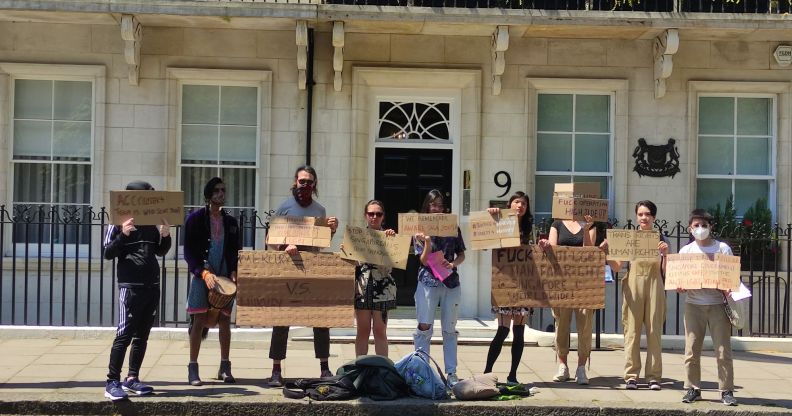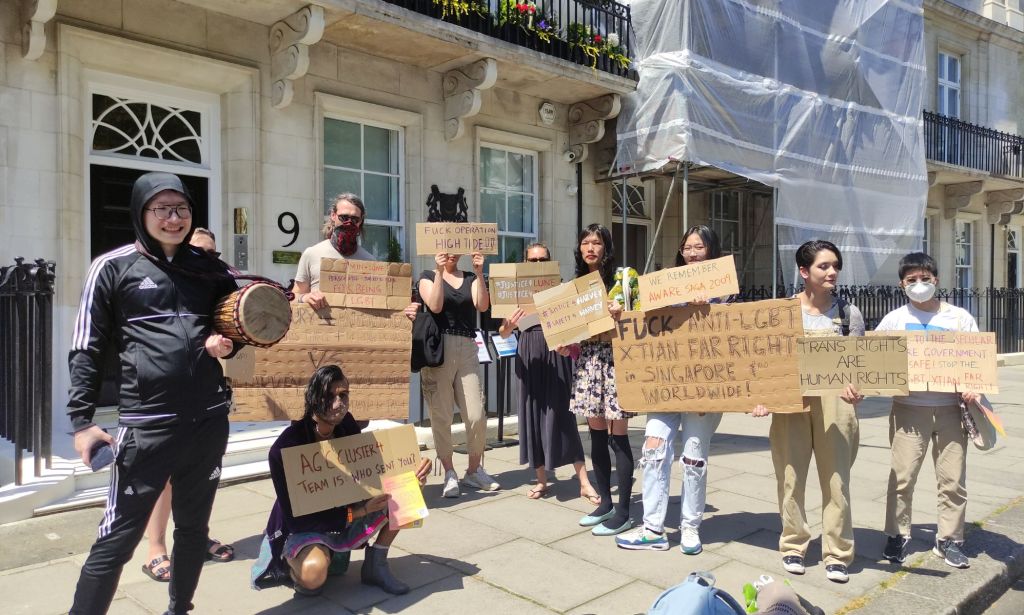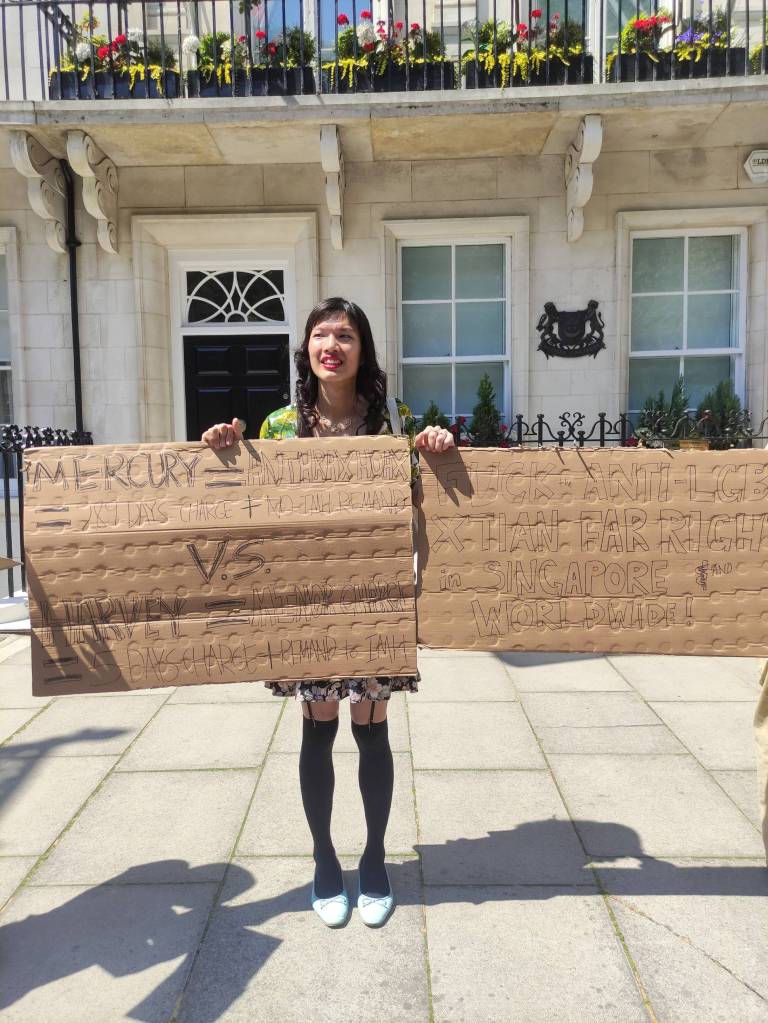Singapore: Autistic trans woman faces being sent back to institute ‘where she was raped’

Lune Loh and J-min, queer and trans Singaporeans, are now seeking safety in the UK after fleeing anti-LGBTQ+ persecution in Singapore. They held a protest in London to raise awareness about the attacks they and others faced in the city-state. (Safety4Harvey UK)
Last month, a group of LGBTQ+ activists and allies stood outside the Singapore High Commission in London, to demand justice for one of their own: Vickreman “Harvey” Chettiar.
An autistic, trans Tamil woman living in Singapore, Harvey was allegedly raped at the Institute of Mental Health (IMH) in 2014 while detained on a male ward.
Following her assault, Harvey filed a police report. No action was taken against her alleged rapist. In 2016, she filed a civil suit against the National Healthcare Group, which owns IMH, hoping for some measure of justice, but her case was struck out in March 2021.
Harvey’s ordeal has deeply affected her.
According Justice4Harvey and Safety4Harvey, movements which sprung up to advocate for her, she is currently facing four criminal charges for minor offences linked to her “traumatising experiences in 2013 and 2014”. Harvey destroyed a table in a courthouse, during her civil proceedings, while experiencing a PTSD-induced flashback. As a result of the charges, she could be sent back to IMH.
Separately, Harvey has been charged with harassment after allegedly posting an online threat aimed at president Halimah Yacob. A pre-trial conference is expected to take place imminently. If her bail is revoked, Harvey would be sent immediately to a male prison where it’s feared she would face discrimination and risks to her safety.
The protesters who gathered in London called for Harvey to be given dignity, and for her not to be sent back to IMH. They fear that if she is, her life will be at risk.
They also explained how Harvey and trans people in Singapore are the targets of the Christian far right. Some told of how they are currently seeking asylum in the UK as a result of this persecution.
Lune Loh is a trans activist currently studying for her master’s in London.
She said that because of her activism, the Christian far right plan to have her arrested and institutionalised should she return home, forcing her to seek asylum in the UK.
“They have a vested interest against me, because they look at me and see that I’m pushing for trans protections and for our right to exist in dignity,” she told PinkNews.
J-min is a non-binary activist from Singapore who is also seeking asylum in the UK. She also claimed she’s been targeted by far-right religious groups, who she said have attempted to frame her for her grandfather’s death. She fled to the UK after this, fearing for her safety, where she’s now seeking asylum from anti-LGBTQ+ persecution.
Christian right holds huge sway in Singapore
In 2022, Singapore repealed Section 377A of its penal code, under which same-sex relations had been a crime. But, at the same time, the government bolstered rules preventing same-sex marriage by amending the country’s constitution.
This was widely seen as a move to appease religious groups and conservatives angry at the shake-up of so-called traditional family values.
Christian groups have argued that “Singapore is a secular society” and that Section 377A shouldn’t have been repealed – instead, remaining on the books while not being enforced. Others argued removing the law would “embolden” LGBTQ+ activists as it “shifts homosexuality away from prohibition to permission”.
The impact of this moralistic attack on LGBTQ+ rights can be seen in the previous challenges to Section 377A, which date back to 2012. These cases were thrown out on the grounds that the anti-LGBTQ+ law was meant to preserve public morality and symbolise society’s disapproval of male homosexuality, the South China Morning Post reported.

Recently, the country’s government has begun looking at ways to deal with so-called cancel culture as “anti-woke” rhetoric takes hold, Loh added.
“In the past five years, and it’s just in the past five years, we started hearing about things like ‘culture wars’ in Singapore,” she said.
“A lot of people like to accuse one another of importing Western values. When the more-conservative side accuses LGBTQI+ people of bringing in Western values, Western practices, the [phrase] they use is ‘alternative lifestyles’.
“In recent years, more people have been using the word ‘woke’ in Singapore for no reason other than the fact that it’s being used by [their] alt-right counterparts in the US.”

“Today, we’re here for Harvey,” Loh said during the protest. “Today, we are here because we’re against the Christian far right in Singapore, the political presence and the fact that they’ve tried to take over politics in Singapore and the world, and they have networks across the world and they’re trying to push back trans rights.”
In 2022, the National Council of Churches of Singapore called on the government to guarantee the freedom of the clergy to preach against queer sex, and the Roman Catholic Archdiocese of Singapore warned against a “slippery slope of no-return, weakening the fabric of a strong society”.
Christian groups are known to practice so-called conversion therapy in Singapore.

